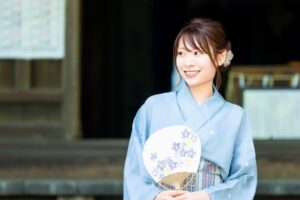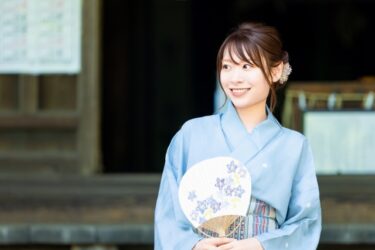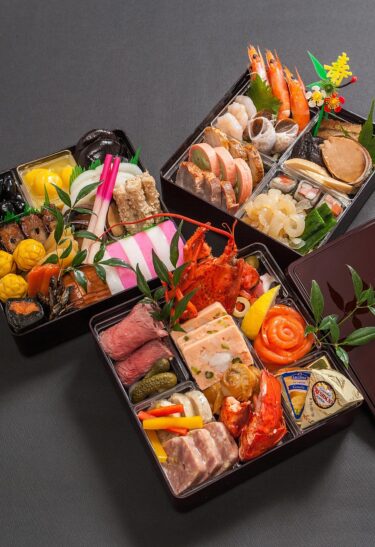【この記事でわかること】
✓ お盆休みの英語表現3パターン
✓ ビジネスメールですぐ使える例文15選
✓ 外国人への文化説明方法
✓ 間違いやすい表現の正しい使い方
お盆休みは英語で「Obon holiday」「summer vacation」「Buddhist holiday」の3つの表現があります。
8月になると外国人の同僚から「なぜ日本では8月中旬に長期休暇があるの?」と聞かれることがありませんか?
この記事では、お盆休みの英語表現から文化的な説明方法まで、働く人に必要な表現を完全網羅します。
「お盆休み」ビジネスシーンでの英語の適切な表現を覚えて、外国人の同僚やクライアントに日本文化を上手に紹介してみましょう。
目次
お盆休み……英語で説明する基本パターン
外国人に「お盆休み」について英語で説明する際は、相手の文化的背景を考慮することが大切です。
以下の表現を使って段階的に説明しましょう。
基本的な説明
- “Obon is a traditional Japanese Buddhist festival.”(お盆は日本の伝統的な仏教行事です)
- “It’s a time when we honor our ancestors’ spirits.”(先祖の霊を敬う時期です)
- “Japanese people believe that ancestors’ spirits return home during this period.”
(この期間中、先祖の霊が家に帰ってくると日本人は信じています)
お盆休みを英語で説明する時のコツは、まず簡潔な定義から始めて、
相手の興味に応じて詳細を加えることです。
「It’s like your Thanksgiving, but for honoring ancestors」
といった比較表現を使うと、理解してもらいやすくなります。
より詳しい説明
- “Obon is one of Japan’s most important cultural events, similar to how Christmas is important in Western countries.”
(お盆は、西洋諸国でクリスマスが重要であるように、日本で最も大切な文化的行事の一つです) - “It’s both a religious observance and a family reunion time.”
(宗教的な行事であると同時に、家族団らんの時でもあります)
お盆休みの期間を説明しよう
時期について
- “Obon usually takes place in mid-August.”
(お盆は通常8月中旬に行われます) - “Most companies give employees about a week off during this time.”
(多くの会社がこの時期に約1週間の休暇を与えます) - “It’s typically from August 13th to 16th, but many people take additional days off.”
(一般的には8月13日から16日ですが、多くの人が前後に休暇を取ります)
なぜこの時期なのか
- “The dates vary by region, but most of Japan observes it in August.”
(地域によって日程は異なりますが、日本の大部分では8月に行われます) - “It’s one of Japan’s three major holiday periods, along with Golden Week and New Year.”
(ゴールデンウィークや正月と並ぶ、日本の三大連休の一つです)
お盆期間中には何をする? 活動を説明しよう
家族の集まり
- “Families gather together, often traveling long distances to meet.”(家族が集まり、長距離を移動して会うことが多いです)
- “People return to their hometowns to visit family graves.”(人々は故郷に帰って家族の墓参りをします)
- “It’s similar to Thanksgiving in America, where families come together.”(アメリカの感謝祭のように、家族が集まる行事です)
宗教的・文化的活動
- “We clean our ancestors’ graves and offer flowers, food, and incense.”(先祖の墓を掃除し、花や食べ物、お香を供えます)
- “Many families set up special altars at home called ‘bon-dana’.”(多くの家庭では「盆棚」と呼ばれる特別な祭壇を設置します)
- “We light lanterns to guide the spirits back home and send them off again.”(霊を家に導き、再び送り出すために提灯を灯します)
お盆休み ビジネス場面でどう伝える?
ビジネス環境では、相手や状況に応じて表現を使い分けることが重要です。
以下の3つのパターンを使い分けましょう。
1.フォーマルなビジネス文書
“Our company will be closed for the Obon holiday period.”
2.同僚との日常会話
“I’m taking some time off for Obon next week.”
3.海外クライアントへの説明
“This is a traditional Japanese holiday similar to your Memorial Day.”
ビジネスシーンでの説明
同僚への事前説明
- “We have a traditional holiday called Obon coming up in August.”(8月にお盆という伝統的な祝日があります)
- “Many businesses will be closed during the Obon period.”(お盆期間中は多くの企業が休業します)
- “It’s when Japanese people typically take their summer vacation.”(日本人が夏休みを取る一般的な時期です)
お盆休みを英語メールで伝える定型文
ビジネスメールでお盆休みを連絡する際の実用的な例文をご紹介します。
件名(Subject line)
“Office closure notice – Obon holiday period”
“Out of office: August 13-16 (Obon holidays)”
本文テンプレート
“Dear [Name],
I would like to inform you that our office will be closed from August 13th to 16th for the Obon holiday period. This is a traditional Japanese festival when most businesses are closed.
We will resume normal operations on August 17th and respond to all inquiries at that time.
Thank you for your understanding.
Best regards,
[Your name]”
海外クライアントへの連絡
- “Please note that our office will be closed from August 13th to 16th for the Obon holiday.”(お盆休暇のため、8月13日から16日まで弊社は休業いたします)
- “This is a traditional Japanese festival period when most businesses are closed.”(これは日本の伝統的な祭事期間で、多くの企業が休業します)
- “We will resume normal operations on August 17th.”(8月17日より通常業務を再開いたします)
お盆の起源と意味を説明する
歴史的背景
- “Obon has its roots in Buddhist tradition, but it’s now observed by people of all religions.”(お盆は仏教の伝統に根ざしていますが、現在はあらゆる宗教の人々によって行われています)
- “The tradition dates back over 500 years.”(この伝統は500年以上前にさかのぼります)
- “It combines Buddhist beliefs with ancient ancestor worship.”(仏教の信念と古代の祖先崇拝が組み合わさっています)
文化的意味
- “It reflects the Japanese value of respecting elders and ancestors.”(年長者や先祖を敬う日本の価値観を反映しています)
- “It’s about maintaining connections between the living and the deceased.”(生者と死者の間のつながりを維持することです)
- “The festival emphasizes the importance of family bonds.”(この祭りは家族の絆の重要性を強調しています)
現代のお盆について説明する
現代的な側面
- “While it has religious origins, many people today see it mainly as a family holiday.”(宗教的な起源がありますが、今日多くの人は主に家族の祝日として捉えています)
- “It’s become somewhat commercialized, like many traditional holidays.”(多くの伝統的な祝日と同様に、やや商業化されています)
- “Some young people are less religious but still participate in family gatherings.”(一部の若者は宗教的でなくても、家族の集まりには参加します)
社会への影響
- “Transportation gets extremely crowded during Obon.”(お盆期間中は交通機関が非常に混雑します)
- “It’s one of the peak travel times in Japan.”(日本の旅行繁忙期の一つです)
- “Many tourist destinations are packed with Japanese families.”(多くの観光地が日本の家族連れで混雑します)
よくある質問への回答
Q:「クリスマスのようなもの?」
- “It’s similar to Christmas in that families gather, but the purpose is different.”(家族が集まるという点ではクリスマスに似ていますが、目的が異なります)
- “Christmas celebrates birth, while Obon honors the deceased.”(クリスマスは誕生を祝いますが、お盆は故人を敬います)
Q:「幽霊祭り?」
- “It’s not scary like Halloween. It’s a peaceful, respectful remembrance.”(ハロウィンのように怖いものではありません。平和で敬意に満ちた追悼です)
- “We believe spirits return as loving family members, not ghosts.”(霊は幽霊ではなく、愛する家族として帰ってくると信じています)
個人的な体験を共有する表現
自分の予定を説明する
- “I’m going back to my hometown to visit my grandparents’ grave.”(祖父母の墓参りのために故郷に帰ります)
- “My whole family will gather at my parents’ house.”(家族全員が実家に集まります)
- “We’ll have a traditional meal together and share family stories.”(一緒に伝統的な食事をして、家族の話をします)
感情を表現する
- “It’s a meaningful time for me to connect with my roots.”(自分のルーツとつながる意味深い時間です)
- “I feel close to my ancestors during this time.”(この時期は先祖を身近に感じます)
- “It helps me remember what’s truly important in life.”(人生で本当に大切なことを思い出させてくれます)
まとめ
お盆を英語で説明する際は、相手の文化的背景を考慮して、比較できる行事を引き合いに出すと理解しやすくなります。
特にビジネスシーンでは、適切な表現を選ぶことで、プロフェッショナルな印象を与えることができます。
メールでの連絡や、お盆 英語 期間の説明も含めて、状況に応じた使い分けを心がけましょう。
また、お盆が単なる休暇ではなく、日本人の価値観や家族観を反映した深い意味を持つ文化的行事であることを伝えることで、日本文化への理解を深めてもらえます。
このような文化的説明ができると、英語での コミュニケーションがより豊かになり、国際的な職場や友人関係でも貴重な文化交流の機会を作ることができます。











